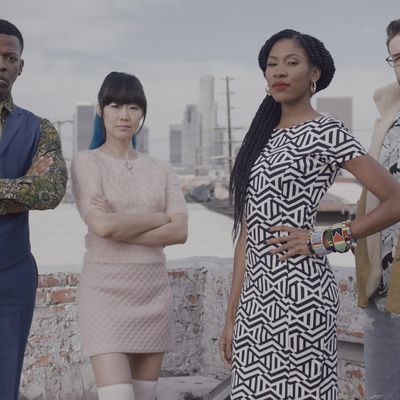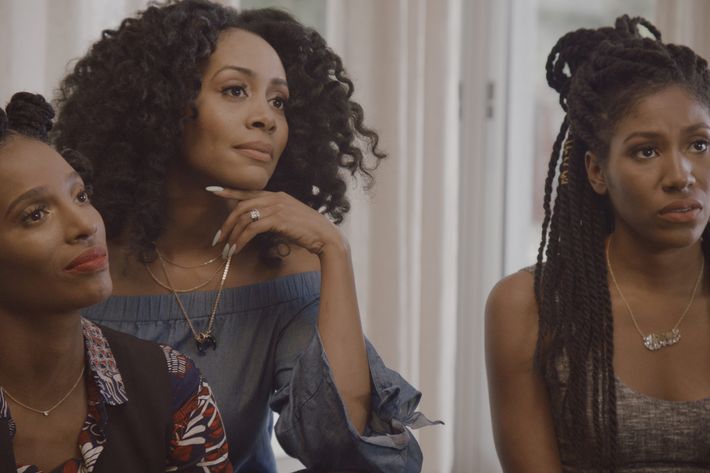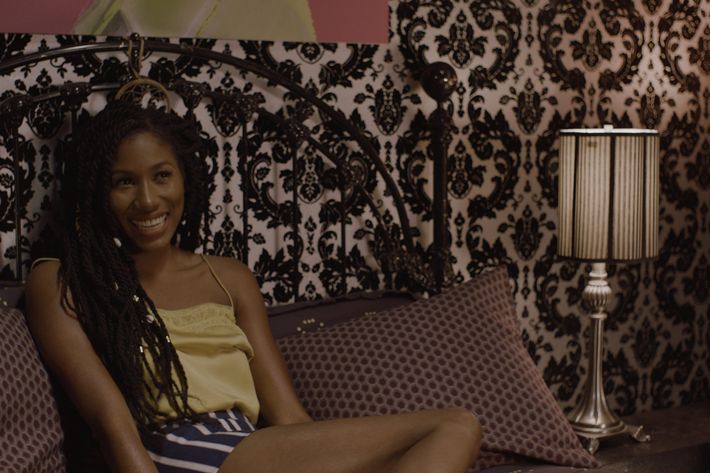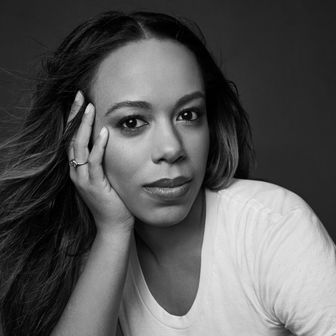
“You’re making people uncomfortable,” says Sarah, a character first introduced to viewers as “the best white friend.” She’s speaking to Akosua Millard (Koko), a black woman who has just spent the better part of a party bemoaning political correctness.
“Why is everyone so obsessed with comfort?” Koko fires back. “Shouldn’t we lean into the uncomfortable moments? Isn’t that the only way we’re ever really going to get to know each other?”
ABC Digital’s American Koko addresses the delicate subject of race with the subtlety of a bullhorn. Each episode explodes the kernel of modern racial angst into comedic popcorn. You can’t stop gobbling it up, so it’s a good thing each episode of the show’s two seasons averages about ten minutes long.
Koko, played by the show’s creator Diarra Kilpatrick, is a Los Angeles race detective at the Everyone’s a Little Racist Agency, which has the daunting mandate of ending racism in America. The agency employs a kaleidoscope of characters to see this through: Baldwin Bledsoe, a young black man who has invented a mathematical algorithm to determine whether someone is racist; Lucky Ling, an Asian woman who embodies the optimism of American multiculturalism; and Milo Gold, whose super [detective] power is white privilege.
Together they help their well-meaning liberal clients solve race issues. A teacher faces the quandary of who to cast in the lead role of the school musical about Harriet Tubman: The sole black student who can’t carry a tune, or the Latina student whose voice brims with soul? (“We can’t have a Latina Harriet Tubman!” Koko argues.) Later on, a man acquitted of any wrongdoing after killing an unarmed black teen seeks the agency’s help to be certified non-racist. The show, which is produced by Viola Davis and her husband Julius Tennon, has a knack for being at once surreal and spot-on.
The Cut talked to Diarra Kilpatrick about her ambitious project with American Koko, the issues surrounding current race conversations, and why it’s time to embrace being an angry black woman.
How would you describe American Koko?
American Koko is a short-form digital series about a woman who is trying to solve America’s race problems while she tries to make amends with her own personal life. It’s definitely a satirical version of Law & Order smashing into Sex and the City with diversity and comedy. That’s the best way I can describe it. I like to strain different parts of real life and to make something that’s a part of our culture really odd so that we can explore it and understand it a little bit better.
That’s really interesting. I feel like you see that more and more now when it comes to something tricky like race. Get Out immediately comes to mind and how it was an exploration of race in a ridiculous setting, but it really opened up the conversation as well.
A lot of times when you’re talking about really important stuff, the tone turns serious and you feel like, “This should be a documentary.” I think that’s what Get Out had.That’s what I hope to do too. Even though I have important things to say and I want to talk about things that are relevant and representative of the time that we’re in, I still want people to laugh and I still want people to cry. [I want viewers] to feel like they went on a journey.
It feels as though part of the reason you created this show is that you wanted to change the way the conversation about race is addressed.
When I first started writing, Obama was president, and there was this idea that all race problems dealt with people trying to act appropriately in post-racial America. That was the rumor that was floating around, that racism was basically dead. I thought that was ridiculous — this country was built on top of a legacy of racism. Until we pluck the roots, it’s going to persist throughout society.
Would you say the purpose of the show has changed in the post-Obama era we’re living in now?
No. Before, it was like, “There’s a problem, but we’ve come so far.” Now there’s a slight shift to, “Yeah, there’s a big problem still.” For me, I’m not that interested in wallowing in the fact that there’s a problem. My mind goes to, “How do we fix it? How do we even begin to tackle something so heavy and so multifaceted and so insidious as racism?” We’ve seen video tapes of black girls getting pushed at Trump rallies, and we’ve heard the reports of hijabs ripped off after Donald Trump won, and we mourn every few months — it feels like — another black man who’s been shot. We saw Philando Castile’s mom on the steps of that courthouse. It feels really urgent right now in a way that even if it was also urgent in Obama’s administration, the public conversation wasn’t suggesting that.
I think that speaks to the racism that we know and have come to expect. I also sense that American Koko addresses how liberals address race, and how there’s a tiptoeing around certain subjects to maximize their “wokeness.”
A lot of times liberal Americans frustrate me more. I love when Chris Rock was talking about how he went to some event at the White House, and he was like, “These are all of the nicest white people in Hollywood, and they still don’t hire people of color.” I thought that was really funny because sometimes that’s where the work has to be done. These are the people that are saying, “I want to be inclusive” or “I want to be better,” but they just don’t know how.
Everybody who has racism isn’t a bad person down in their soul, they’re just ignorant. In some cities — like where I’m from in Detroit — it’s still very segregated. Integration happens and we never got a manual about how to make it work peacefully. That’s really how the show started: It was like we’re supposedly in a post-racial America, but we don’t know how to behave around each other. That’s season one. Then season two is digging into more serious issues of: Do we have hate for each other in our hearts, how do we tackle that and what is the root of that?

The agency in American Koko is called “Everyone’s a Little bit Racist.” Do you think everyone’s a little racist?
Some people think it’s splitting hairs, but I do think that there’s an important distinction between racism and prejudice or bigotry. Often times when people are talking about racism, we’re talking about it from an academic point of view. Racism does have to do with institutions and systems of oppression, so everybody can’t be racist technically, but for sure everybody can be prejudiced [or] bigoted. We all have prejudices. I think it’s impossible to grow up in this country and watch television and consume media and not be governed on some level by prejudice.
The show doesn’t seem to let anyone off the hook, like when Koko says Asians can’t drive, or even when Koko claims a man is gay based on his outfit. It made me think of how even in the black community we have these strict ideas of masculinity and our own prejudices.
You can’t put any character in the good or bad column. Because she [Koko] has so many strong opinions, it would be too annoying for her to be perfect. And she’s not perfect — she says a lot of things that are inappropriate, or that I don’t even believe or agree with, but I it’s important to hear people say it out loud because you can start to see yourself in that character and be like, Oh, I don’t know if that’s cool. When you see somebody else do it, it gives you that opportunity to look at your own self and see where your own morals stack up. It’s fun that she’s kind of dead wrong sometimes, and sometimes she’s dead right.
You mentioned the good and bad column. Do you think that’s an issue with the way the conversation around race is conducted now — the need to put people in this good or bad column?
People may not even want to come to the table of a race conversation because they feel like they’re gonna be assumed wrong from the jump. So much of it keeps people out of the conversation. It’s like in the election — white people not understanding the term “white privilege,” and they’re like, “Yo, I’m struggling too.” To have someone put the term privilege on them was disconcerting [to them]. It’s hard to even have a dialogue about that. I think it is important to have a phase where it’s okay to be messy as we work our way through the conversation.
Privately, I’ve had these conversations with white friends — how they don’t feel that they’re allowed to talk about some of these issues, that they feel like they’re walking on eggshells. I’m wondering how you feel about that sort of argument.
If you want to have a sensitive conversation, the best place to do it might not be on Twitter. I have a white friend who would quietly be like, “So, what do they mean when they say, ‘protect your edges’?” and we love each other, so I’ll say, “Okay I can break it down for you.” It is important that you ask the people that are close to you first, rather than coming up to the random black woman that you work with and being like, “This that and the third.” If there’s respect — if you come to the conversation open, leading with, “I apologize if this is coming out the wrong way, but I really don’t understand this,” I think people will be receptive. My husband is white — and we talk about this stuff all the time — we just get in there.
Not all white people know a black person they can go to and have that level of conversation in real life. In one way to look at it, Twitter is this great tool to talk to people who you wouldn’t normally talk to in your everyday life — there’s so much potential in social media in general as a jumping point to connect people, but at the same time, when that connection happens it usually ends horribly.
I wish there was something like a face-to-face chat room, like the Everyone’s a Little Racist Agency because I understand. Ignorance is not a terrible word, ignorance just means you don’t know. Katy Perry said: “I just didn’t understand why people were upset that I was wearing cornrows and profiting off a culture that I didn’t really understand.” It sounds like she had a dialogue, and she came to an understanding. I wish we could bring a shuttle around the country and have a big old town-hall conversation where people could ask the questions that they need to ask. The biggest thing is getting over yourself.

Koko has a “condition” called Angry Black Woman Syndrome. What is that meant to represent on the show?
I knew that I wanted to play with the Angry Black Woman trope because it’s just so pervasive. So I was thinking, how can we take that and put it on its head? In some ways, it’s something black women are trying to outrun. Viola Davis talked about how that label has been used to cut black women down to discredit whatever the point she is trying to make. When I listened to Philando Castile’s mother speak and she said, “I’m mad as hell,” I thought there was beauty and power in that.
It’s a twofold thing: On one hand, we’re not angrier than anybody else. That label has just been used to deny us a voice. But then, on the other hand, when you do hear women say, “I’m angry,” there’s such power in that because nothing changes unless someone gets angry about it. Anger is sometimes beautiful. And what has been labeled anger is oftentimes passion and sadness and inherited trauma and all these other things that we really need healed.
It reminds me of Solange’s “Mad” when she sings: “You got the right to be mad.”
White male anger has been so legitimized, and I feel like there’s room for black female anger to be legitimized because it comes from such an important place.
Your husband [Miles Orion Feldsott] is in the show. How does he feel about being the “embodiment of white male privilege”?
We both have the same sense of humor and we’re a pretty fearless group over here, so he’s okay.
Are you going to do season three?
We hope so. There is a bunch of stuff that I want to see. You have to holler at ABC. We are hoping that we can get the band to come back together and tell more stories.
It feels like we need this sort of show to really break open the conversation.
I agree. Around the time I started writing, I remember my prayer was: “Use me.” We sing this song at my church that’s like, “Use me.” I would sing that song in the shower. I feel like if I was a tool to help the country break open this conversation, I would be honored to be a catalyst.
This interview has been edited and condensed.


